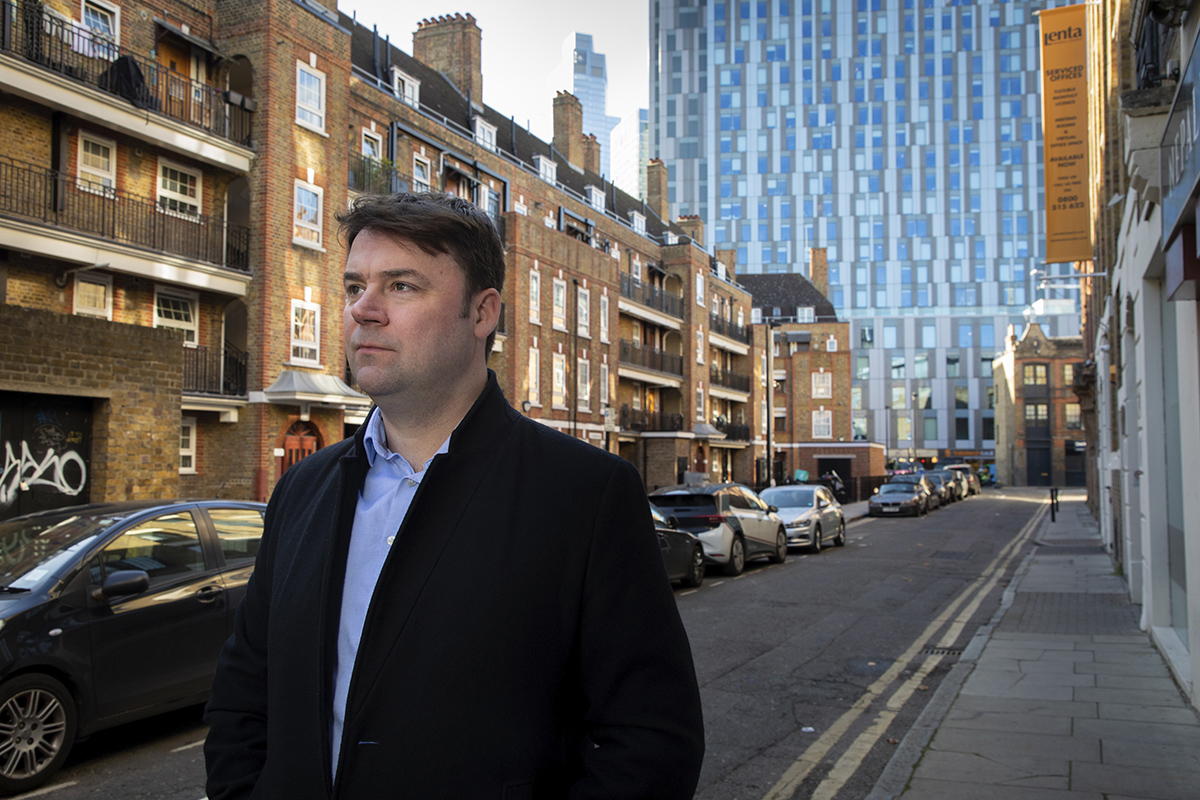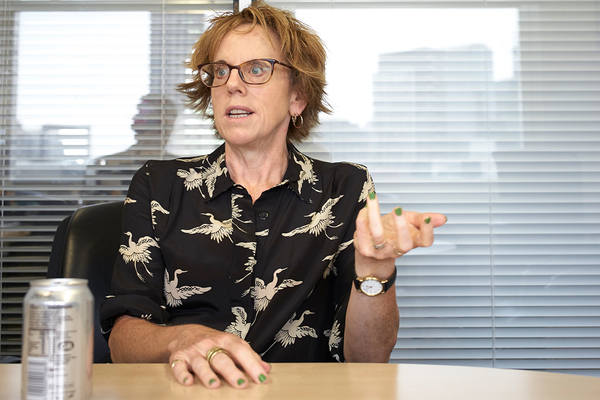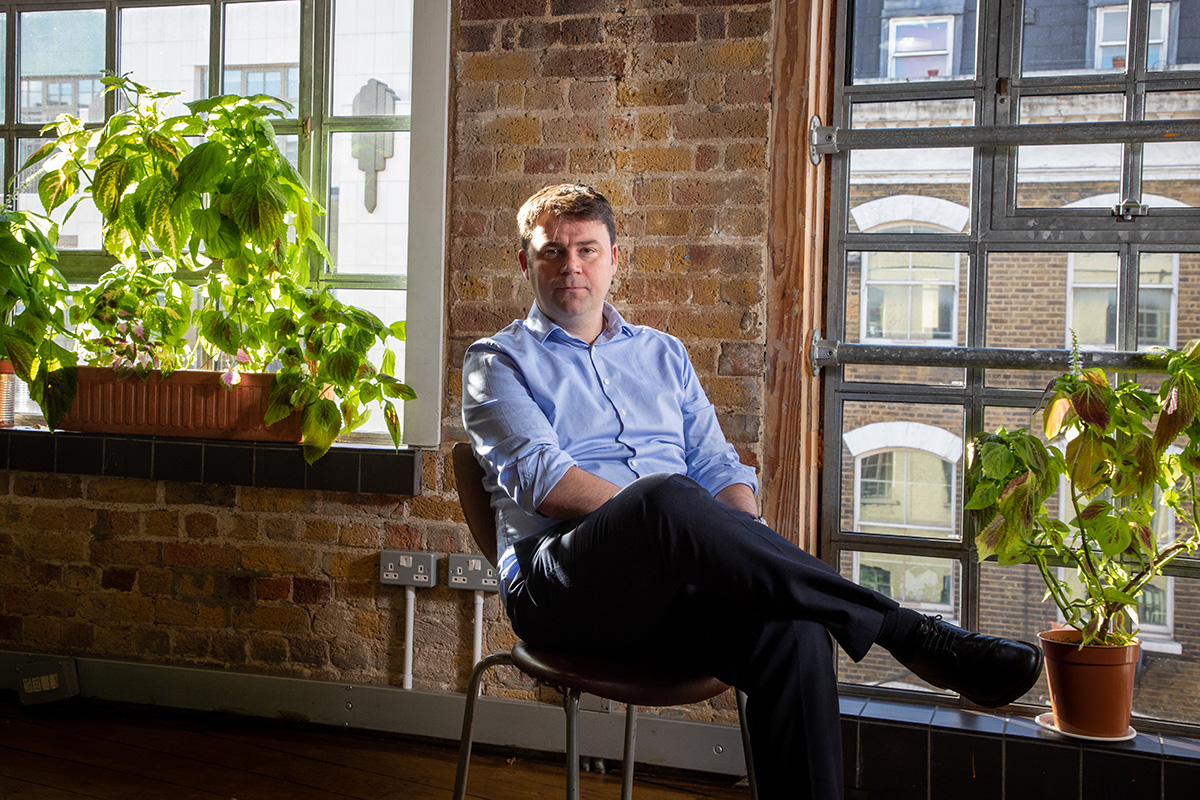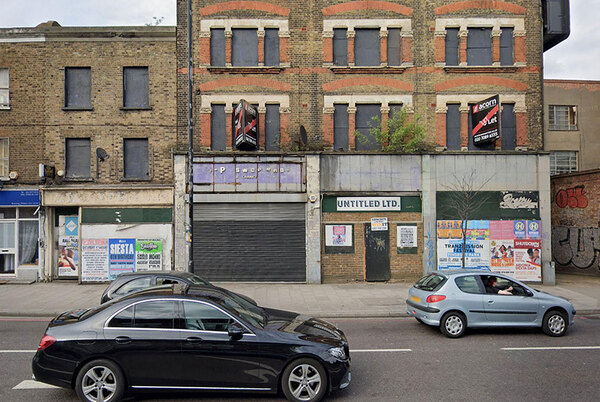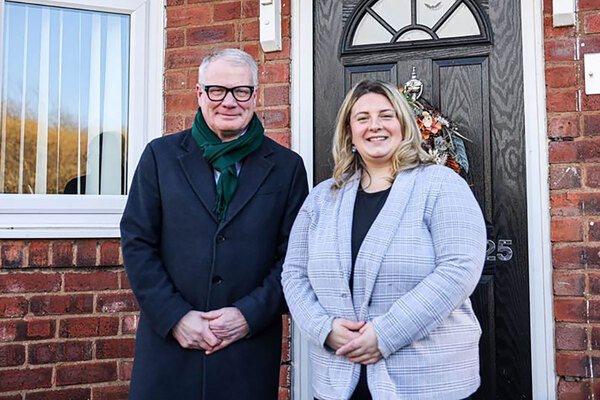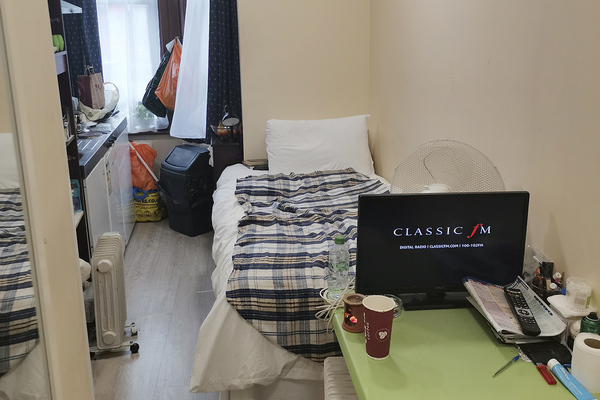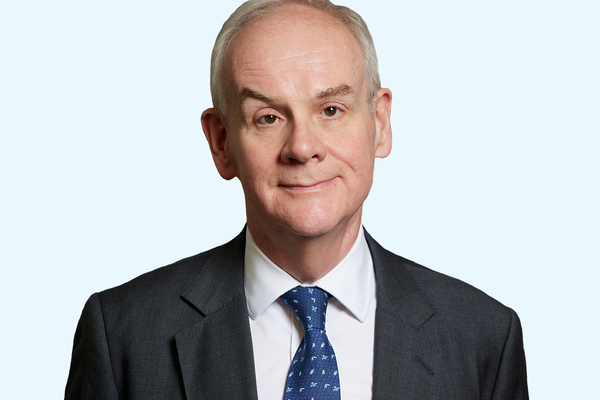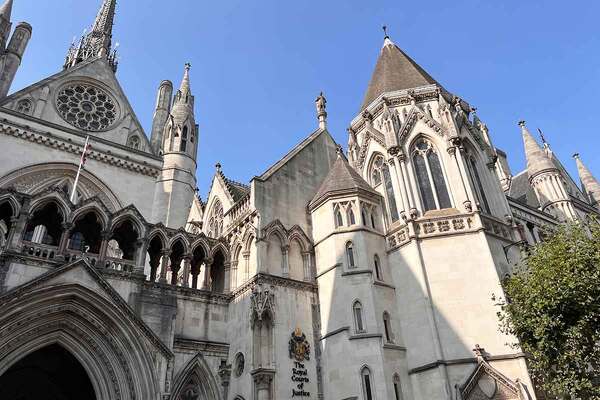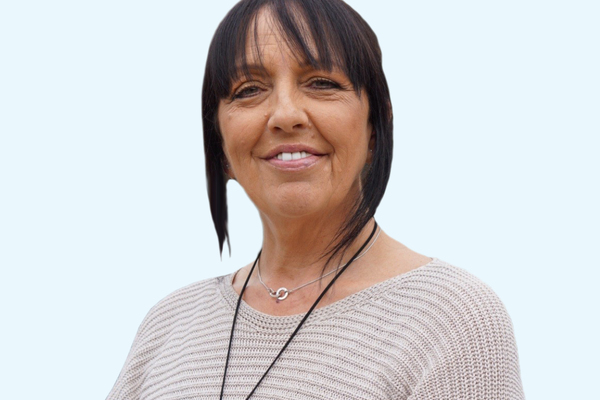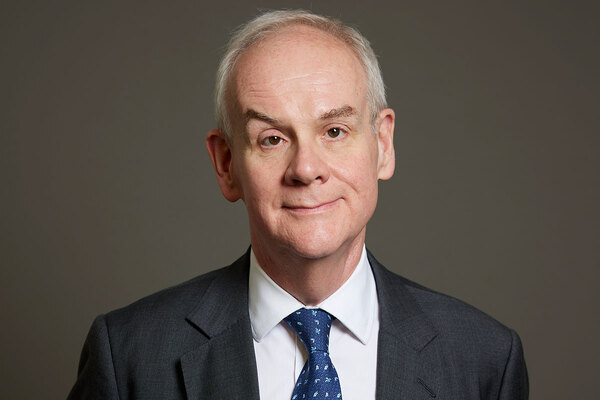You are viewing 1 of your 1 free articles
New Crisis CEO Matt Downie: ‘I don’t believe the arc of history is in progress’ favour. I think you have to fight for it. That is what Crisis is for’
Matt Downie took over as chief executive of Crisis in January. In a wide-ranging interview, he tells Martin Hilditch about his new vision for ending homelessness and why social landlords should change their eviction policies. Photography by Jonathan Goldberg
Matt Downie worked at Crisis for eight years before becoming the homelessness charity’s chief executive in January – but do not make the mistake of suggesting that he might have been picked as the continuity candidate.
“Crisis has had successes over the years, but homelessness hasn’t got better,” he states (yes, I did ask the question!). “So, continuity of our organisation would be a dereliction, really.”
It is quite a statement from someone who has been heavily involved in some of the charity’s notable successes of the past few years, such as the impressive lobbying effort that led to the introduction of the Homelessness Reduction Act in 2017. But you quickly learn that Mr Downie does not want to waste time reflecting on past glories.
“We know that if we continue as we are, homelessness will continue to rise,” he says. “So, there is no point patting ourselves on the back for some of the policy wins we’ve had, when life gets worse and worse for
so many people.”
Let’s not mince words either, then. Inside Housing is meeting Mr Downie to find out what makes him tick and what direction the charity will take under his leadership.
We talk shortly after Holocaust Memorial Day, when Mr Downie tweeted about his great grandfather, “who died before his wife and daughter escaped” and acted as a legal advocate for Jewish people in Vienna. Our conversation about this leads on to a discussion about how Mr Downie’s background might inform his world view – and feels particularly prescient today in light of the invasion of Ukraine.
“I don’t believe at all that the arc of history is in progress’ favour,” he says. “I think you have to fight for it. We’ve seen lots of things certainly in housing where you go backwards as well as forwards. And, you know, I’m absolutely determined that that is what my career is for – and, hopefully, what Crisis is for as well.”
Striking a balance
Mr Downie’s career in charity work began in 1998 at another housing charity, Shelter, as a “very junior member of the finance team” under its then boss Louise Casey. It was a time when he did not have anywhere permanent to live, spending some time sofa-surfing. He says he “needed to stabilise my life”.
Shelter provided that stability, but also an introduction into the real passion of his working life: campaigning. Still in finance roles, he moved to the National Autistic Society. It was there that he made the jump to become the charity’s campaigns manager, leading “lots of amazing campaigns, like the one for the Autism Act, which was the first ever disability-specific law in the country”.
“I never knew that you could get paid for doing something you were passionate for,” he says. “It’s a wonderful realisation when you have it, and when you have it, you run after it – so I did.”
There can be a downside to campaigning, though – and at times it has taken its toll. “By the time I was fully in it, the thing that really struck me is, actually, personally speaking, I get too involved. I have a brother with autism and by the time I left that organisation, it became too much of a personal thing for me. I got probably a bit over-zealous on some of those issues. I think a lot of us who get really, really fired up by the causes we care about need to also check that we look after ourselves”, he says.
“What I found over the years is that unless I sort of regulate that and do other things in my life or tone it down a bit, a) I can probably do myself and the cause a disservice by being a bit too kind of morally certain all the time, and b) you completely burn out. By the end of the Autism Act campaign, which had consumed my life, and similar for the Homelessness Reduction Act, you find yourself not always able to see the wider perspective.”
Today, Mr Downie has learned that “it’s a good thing to be a balanced, rounded human being as well as passionate about something”, and he always comes across as a tremendously personable as well as driven person. Clearly, though, he has lost none of his drive for change – which brings us nicely to his plans for Crisis.
Call for collaboration
In recent years, the charity has published its own detailed analysis of what it would take to end homelessness –
the piece of work that Mr Downie says he is most proud of at Crisis – as, he admits, homelessness is still alive and kicking. So how will Crisis look to change that under his leadership?
For starters, Mr Downie wants the charity to put its money where its mouth is and help to clearly demonstrate that some of the solutions it advocates work. He reveals this plan as we chat about Housing First, an approach to tackling homelessness that looks to provide people with a stable home, along with intensive, open-ended support.
It is an approach that has been demonstrated to work well in other countries. But it has proved difficult to obtain sufficient numbers of properties in some areas in England, such as London, to make the scheme work effectively everywhere. “Still, housing associations in London are not granting properties,” he points out. “Some of the big players could resolve very large parts of the entrenched rough sleeping population and Housing First client group without noticing it… as a kind of rounding error in the number of properties that they have got.”
This is an area where Crisis might look to get more directly involved in delivery to get things moving.
“It’s clear to me that local authorities, housing associations and others need to see demonstration of these things working,” he says. “As yet we’ve not had a homelessness charity step forward and say we want to take some risks with you and show what can be done,” he adds. “And that’s what I want us to do.”
Mr Downie says it is too early to say what this practical action will involve. What he does want is for social landlords “that want to help us answer the question” to get in touch. “I want to work out what the options are and what Crisis can start to demonstrate, particularly where there are higher rates of homelessness.”
Nothing, he says, is off the table at this point – from partnering with good social lettings agencies to setting up a “brand new housing vehicle dedicated towards people who are homeless and particularly Housing First clients”. Crucially, it must be about bringing additional homes into play, he adds.
Beyond this, Mr Downie says that by the time he leaves Crisis “I want us to be on the path to understanding when we’ll be out of business.” In order to do this, Crisis might actually do fewer things “but get stuck into the bigger questions and answer them”.
“As it stands, there is no plan, certainly in England, for people who are homeless to have anywhere additional to live,” he says. Affordable housing stock is being “degraded” by Right to Buy, among other things, he adds. “We’ve got to go after that as a big challenge.”
He also wants to tackle what he sees as “one of the unspoken, untapped issues in relation to homelessness”.
“There are certain people who are much more likely to be homeless,” he says. “And it’s to do with things that we don’t always like to talk about. So, institutional racism, the way in which disabled people are treated, the appalling treatment of the trans community.”
To date, Mr Downie feels there has “not been enough bravery” in the sector when it comes to talking about some of these issues.
“Why?” he asks. “Why are we not taking these things on as systemic issues that drive homelessness? It may well be because we don’t know how to do it yet. But we’ve got to find out – we’ve got to do it. No kind of modern, progressive organisation can really sit by on this one anymore, because it is staring us in the face.”
Systemic change
One of the biggest issues Mr Downie wants to take on is the way the current system in England deems some homeless applicants to be non-priority, and many others to have made themselves “intentionally homeless”.
“If you actually spend time meeting people who have become homeless and been told these things, it is not only cruel, it is laughable,” he says. The idea of “a sort of undeserving homeless population actually creates homelessness and sustains it”, he adds.
“Until the government in Westminster says we’ve got to abolish these priority need tests and intentionality as well, we simply can’t end homelessness, because you are guaranteeing that some people will be.” He points to Scotland, where a decision to abolish priority need, legislated for in 2003 and implemented in 2012, has seen homelessness fall. Scotland saw the lowest number of homelessness applications this century (33,792) in 2020-21 – down from a high of 60,292 in 2005-06, although the number of households in temporary accommodation has been shooting up.
Social landlords should be doing their bit too, Mr Downie suggests. He references the Homes for Cathy group of associations, which have signed a collective pledge not to make homeless any tenant seeking to prevent their homelessness.
But not all associations have signed up to the group, or are looking to make similar pledges, he notes.
Finally, he also has some strong words to say about some exempt accommodation providers. Exempt accommodation is often used for people who need additional support, such as prison leavers, recovering addicts, refugees and those fleeing domestic violence. Since a small level of support is required, this type of housing is exempt from usual Local Housing Allowance caps, meaning providers can often charge very high rates of rent that are well above usual housing benefit levels. But there are growing fears that some providers are fleecing the system and not providing the appropriate support.
Most alarmingly, Mr Downie thinks there are scandals “akin to Winterbourne View” taking place in the sector, referring to the hospital where adults with learning disabilities were subjected to systemic abuse by staff.
The Levelling Up, Housing and Communities Committee is currently investigating exempt accommodation and Mr Downie hopes the inquiry will “be bold and think about what the settlement in the future needs to be to make sure people get the support they need, through models like Housing First”.
Our time draws to a close and Mr Downie is off to make a start. He has set himself one hell of a challenge. But he is clearly not the type of person who is going to die wondering.
Sign up for the IH long read bulletin
Already have an account? Click here to manage your newsletters
